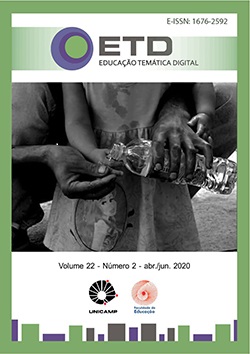Abstract
The Digital Culture emerges from several social practices that incorporate digital technologies into everyday life. Inscribed in the field of Cultural Studies from a poststructuralist perspective, this exploratory and bibliographical research investigates the connections between Digital Culture and Education, taking as an argument the presence of a Digital Condition in contemporary society. Thus, two research movements are interconnected, being the first a presentation of the concept of Culture and Digital Condition, and the second an analysis of the contours and displacements in the concept of Education, not only as element of schooling instruction and learning, but as a formation process that directs the conducts of the subjects. The theoretical framework has hold in the discussions of Gere (2008), Lister at, al (2009), Stalder (2018), Bauman (2008, 2009, 2010), Foucault (1995, 1998, 2008), among others. Results point to a Digital Condition and an Education in express, individualized style, operated on the mobility and ubiquity of digital artifacts.
References
ALTHUSSER, Louis. Ideology and ideological state apparatuses. In: ALTHUSSER, Louis. (Ed.), Lenin and philosophy and other essays. New York: Monthly Review, 1971.
BAKHTIN, Mikhail. Marxismo e filosofia da linguagem. São Paulo: Hucitec, 1997.
BAUMAN, Zygmunt. Modernidade líquida. Trad. Plínio Dentzien. Rio de Janeiro: Zahar, 2001.
BAUMAN, Zygmunt. A sociedade individualizada: vidas contadas e histórias vividas. Trad. José Gradei. Rio de Janeiro: J. Zahar, 2008.
BAUMAN, Zygmunt. Tempos líquidos. Trad. Carlos Alberto Medeiros. Rio de Janeiro: J. Zahar, 2009.
BAUMAN, Zygmunt. Legisladores e intérpretes. Trad. Renato Aguiar. Rio de Janeiro: J. Zahar, 2010.
CASTELLS, Manuel. A sociedade em rede. Trad. Roneide Venâncio e Jussara Simões. São Paulo: Paz e Terra, 1999.
COSTA, Marisa Vorraber. Estudos culturais e educação – um panorama. In: SILVEIRA, Rosa M. H. (Org.). Cultura, poder e educação: um debate sobre os estudos culturais em educação. Canoas: ULBRA, 2005, p.107-120.
FOUCAULT, Michel. Vigiar e punir: nascimento da prisão. Tradução de Raquel Ramalhete. Petrópolis: Vozes, 1987.
FOUCAULT, Michel. A arqueologia do saber. Rio de Janeiro: Forense-Universitária, 1995.
FOUCAULT, Michel. A ordem do discurso: aula inaugural no Collège de France, pronunciada em 2 de dezembro de 1970. Trad. Laura F. A. Sampaio. Campinas: Loyola, 1998.
FOUCAULT, Michel. Nascimento da biopolítica. São Paulo: Martins Fontes, 2008.
GERE, Richard. Digital culture. London: Reaktion Books, 2008.
GRAMSCI, Antonio. Cadernos do cárcere. Rio de Janeiro: Civilização Brasileira, 1999. v.1
HALL, Stuart. The work of representation. In: HALL, Stuart (Org.) Representation: cultural representations and signifying practices. London: Sage, 1997.
HARAWAY, Donna. Manifesto Ciborgue. Ciência, tecnologia e feminismo-socialista no final do século XX. In: TADEU, Tomaz T. (Org.) Antropologia do Ciborgue. As vertigens do pós-humano. Belo Horizonte: Autêntica, 2000.
DERRIDA, Jacques. A escritura e a diferença. São Paulo: Perspectiva, 1995.
DERRIDA, Jacques; ROUDINESCO, Elisabeth. De que amanhã... Diálogo. Rio de Janeiro: J. Zahar, 2004.
KRISTEVA, Julia. Sèméiotikè: recherches pour une sémanalyse. Paris: Seuil, 1969.
LÉVY, Pierre. Cibercultura. Trad. Carlos Irineu da Costa. São Paulo: Editora 34, 1999.
LISTER, Martin; DOVEY, Jon; GIDDINGS, Seth; GRANT, Iain; KELLY, Kieran. New media: a critical introduction. New York: Routledge, 2009.
LYOTARD, Jean-François. A condição pós-moderna. Rio de Janeiro: José Olympio, 2000.
MANOVICH, Lev. The language of new media. Cambridge, MA: MIT Press, 2001.
McLUHAN, Marshall. Os meios de comunicação como extensões do homem. Trad. Décio Pignatari. São Paulo: Cultrix, 1970.
PEIRCE, Charles Sanders. Semiótica. São Paulo: Perspectiva, 2000.
POSTER, Mark. Information Please: Culture and politics in the age of digital machines. Durham, N.C.; London: Duke Univ., 2006.
RIFKIN, Jeremy. The age of access: the new culture of hypercapitalism, where all of life is a paid-for experience. New York: J.P. Tarcher/Putnam, 2000.
ROSE, Nikolas. Governando a alma: a formação do eu privado. In: SILVA, Tomaz T. (Org.) Liberdades reguladas. Petrópolis: Vozes, 1998.
SAUSSURE, Ferdinand. Curso de linguística geral. 26. ed. Tradução de Antônio Chelini, José Paulo Paes e Izidoro Blikstein. São Paulo: Cultrix,1990.
STALDER, Felix. 2018. The digital condition. Cambridge: Polity, 2018.
WIENER, Norbert. Cibernética e sociedade. São Paulo: Cultrix, 1954.
WILLIAMS, Raymond. Technology and cultural form. Londres: Shocker Books, 1975.
The ETD - Digital Thematic Education uses the Creative Commons license (CC), thus preserving the integrity of the articles in an open access environment.


